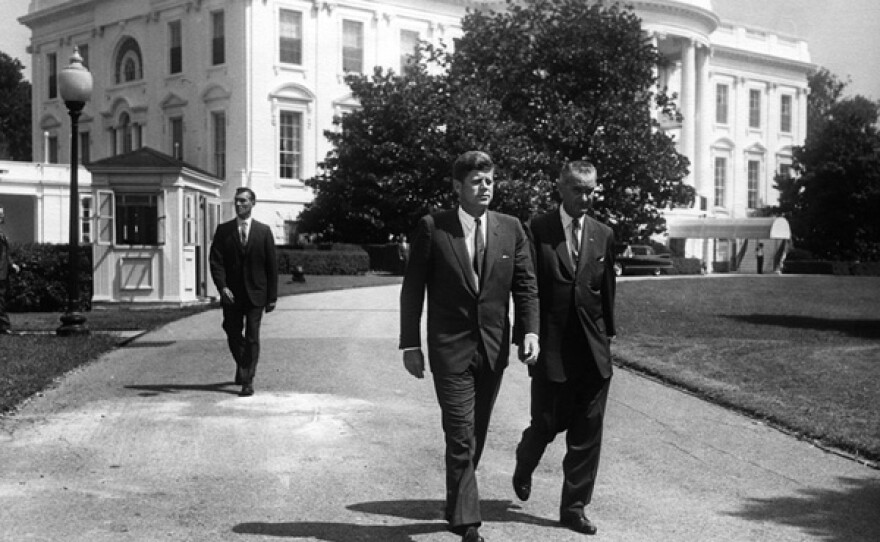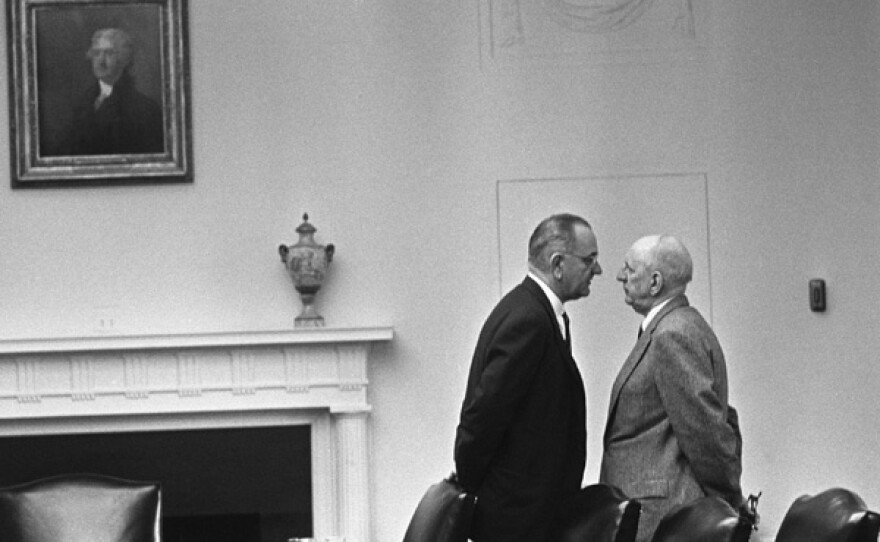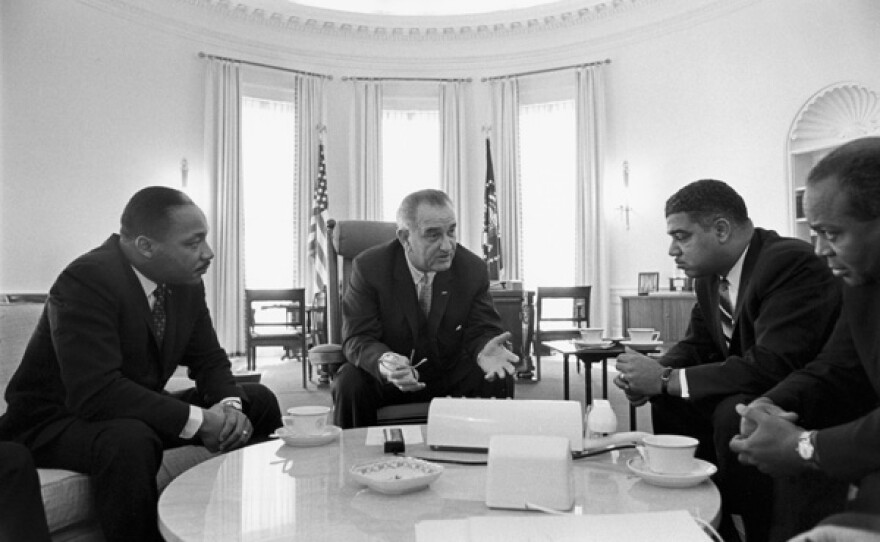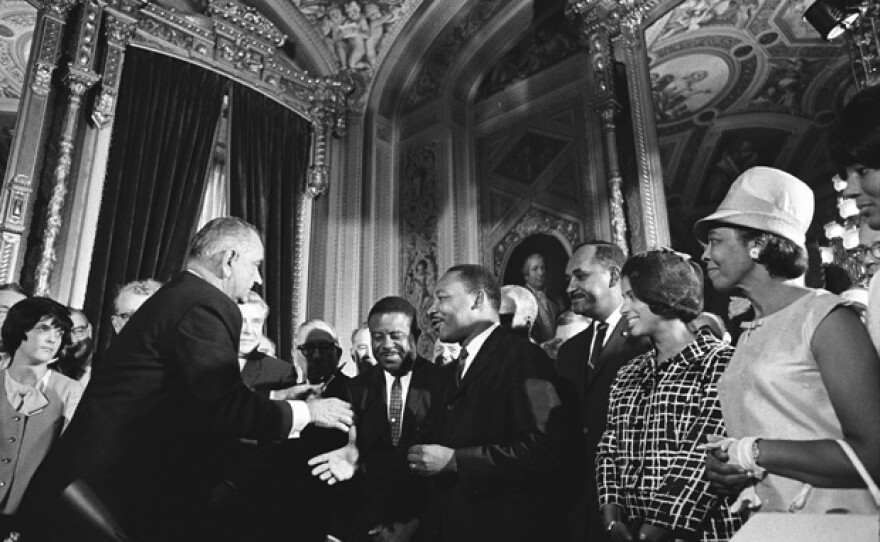Part 1"LBJ: My Fellow Americans" encores Sunday, Sept. 22 at 11 p.m. and Wednesday, Oct. 2 at 8 p.m. on KPBS 2 + Part 2 "LBJ: Beautiful Texas" encore Wednesday, Sept. 25 at 8 p.m. on KPBS 2 / Stream now with the PBS app
Lyndon B. Johnson, a poor, rural Texan who became a vice president and president only to see his unprecedented social agenda undermined by a war he supported but never understood, is the subject of a four-hour biography from the AMERICAN EXPERIENCE Peabody Award-winning collection The Presidents. “LBJ” is the Winner of an an Alfred I. duPont-Columbia University Award.
Five years in the making, “LBJ” offers a look at disputed events of the past, including the Tonkin Gulf episode and the decision to “Americanize” the war in Vietnam in July 1965. It also examines the “stolen” senatorial election of 1948.

The visual record of Johnson’s political life has never been scrutinized more closely. The production team secured never-before-broadcast family movies, rare Navy Signal Corps footage, and voluminous still photos taken by U.S. Information Agency photographers who had unprecedented access to the president.

In addition, the film features interviews with his wife Lady Bird, George Ball, Clark Clifford, John Connally, cousin Ava Cox, Daniel Ellsberg, Sen. J. William Fulbright, Doris Kearns Goodwin, Nicholas Katzenbach, George Reedy, Dean Rusk, Sargent Shriver, Roger Wilkins, Andrew Young, and many others.

The arc of Johnson’s life is a version of the American dream — the poor boy from the backwaters of the Texas hill country ascending to the very pinnacle of power. Driven by an all-consuming ambition, Johnson was big, brash, and intimidating — a man who dominated people and institutions. He was a man of excesses and unwieldy contradictions. As a member of the House of Representatives, Johnson never voted for a civil rights bill — but as president, he signed the two most sweeping civil rights bills since Reconstruction. Few presidents before or after had such an effect on Congress yet, despite his political genius, his presidency ended in ruins.

In contrast to Johnson’s uncharismatic public persona, the film reveals a man of action, tense with anger or brimming over with charm and enthusiasm — a man most Americans rarely saw. He campaigned with the strength of ten men, one aide said: “It was as though he had an extra pair of glands.”
"LBJ" covers Johnson’s roots in the rural southwest, his early political campaigns, including the “stolen” election of 1948, his mastery of the Senate, his frustrating years as vice president, and his assumption of the presidency, which came about through one of the most dramatic moments in American history — the 1963 assassination of John F. Kennedy. With the much-beloved president gone, the country looked with suspicion at the big Texan with a southern twang and an unsavory past, a political “wheeler-dealer” who, some said, stood for nothing beyond himself. Johnson had to earn the trust of the American people.
His first days in office were dark and difficult. Rumors of shadowy schemes and conspiracies were everywhere, but Johnson reassured a stunned and baffled nation, moving swiftly to continue the Kennedy agenda. “The Johnson treatment,” developed in his Senate years, became a weapon in the arsenal of his presidency. Johnson surprised America with his forceful stand on civil rights and war on poverty. But he had also inherited the war in Vietnam, a war that would defy his political gifts and expose his human failings.

Following his overwhelming victory in the 1964 election, Johnson was one of the most popular presidents of the 20th century. He galvanized the nation with his appeal for racial justice and his vision of a Great Society and passed a tidal wave of legislation: funds for education, conservation, consumer protection, urban renewal and housing, Medicare, civil rights, public television, and the creation of the National Endowments for the Humanities and the Arts. But at the same time, he also ordered the bombing of North Vietnam and, without national debate or congressional approval, committed American troops to a full-scale land war in Asia.
Opposition grew as an increasing number of Americans began to question the Vietnam War, with riots in inner cities and anti-war protests spreading across the country. “I sometimes felt,” he said, “that I was living in a continuous nightmare.”
“‘Whom the gods would destroy, they first make mad,’” said former White House press secretary George Reedy. “This is a man who was so big, that reached so far and made it — and then let the whole thing crumble. I think it’s one of the great stories of history.”
The Presidents Collection On Demand: AMERICAN EXPERIENCE recently launched The Presidents, an all-new digital portal showcasing more than 750 assets from the Peabody Award-winning collection of films about our nation’s most important leaders. The portal allows viewers to screen full-length films, delve deeper with experts and living witnesses, and examine more than 200 primary source documents. Video galleries on The Presidents site explore how different presidents faced issues including the economy, war, dealing with a crisis, and abuses of power.
CONNECT: AMERICAN EXPERIENCE is on Facebook, Instagram
CREDITS: Produced, written, and directed by David Grubin. Senior Producer: Chana Gazit. Editors: Geof Bartz and Tom Haneke. Associate Producers: Hillary Dann and Sam Sills. Cinematographer: William B. McCullough. Original Music: Michael Bacon. Executive Producers: Patricia Perini and David Grubin. AMERICAN EXPERIENCE is a production of WGBH Boston. Senior Producer: Susan Bellows. Managing Director: James E. Dunford. Executive Producer: Mark Samels.





